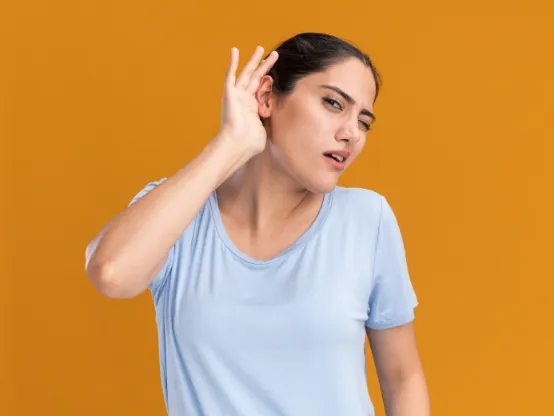
From Marathon Runner to Chronic Knee Pain
This is Tony’s story. He came to us with ongoing knee pain that worsened at work.
Conditions > Hearing Problems
Hearing loss is surprisingly common, affecting 1 in 6 people in the UK who are either deaf or living with hearing loss.
If you are experiencing minor hearing loss or more severe auditory issues, we are here to help you regain your hearing health and enhance your overall well-being.




Hearing loss typically progresses gradually, often evolving slowly over time. Individuals may notice early signs, such as background noises, like tannoy announcements, becoming muffled or unclear.
Additionally, those with hearing impairment might find it difficult to distinguish someone’s voice or perceive their speech as mumbling against background noise.
These subtle but persistent challenges often indicate the early stages of hearing loss and should prompt attention and evaluation to address potential hearing issues.
Age-Related Hearing Loss: Presbycusis is the gradual loss of hearing that occurs with ageing. It typically affects high-frequency sounds and can make it difficult to hear conversations in noisy environments.
Managing Age-Related Hearing Loss: Hearing aids are typically customised to address age-related hearing loss and improve clarity. Additionally, auditory training involves exercises designed to enhance listening skills and speech understanding.


Hearing loss can be categorised by severity, ranging from mild to profound. Mild hearing loss involves difficulty hearing soft sounds, such as a whisper or a ticking clock.
Moderate hearing loss presents challenges in following conversations, particularly in noisy environments. With severe hearing loss, individuals have trouble hearing most sounds and typically require amplification to understand speech.
Profound hearing loss is characterised by very little or no hearing ability, often necessitating the use of hearing aids or cochlear implants.


Protecting your hearing is essential for maintaining good hearing health. To safeguard your hearing, avoid prolonged exposure to loud noises by using ear protection in noisy environments.
Additionally, monitor your medication as some drugs can impact hearing; always consult your doctor before starting or stopping any medication. Regular hearing check-ups are also important, as early detection of changes in hearing can help prevent further damage.


Some hearing loss can be reversed with the correct treatment, so do not hesitate to speak to a doctor if you are having problems. We are available six days a week. Appointments can be made using our online booking system, or over the phone.
We work with experienced consultants & healthcare professionals who have received positive feedback from our patients, and with whom we have established long-term relationships.
Use our online booking engine or book your test by giving us a call.
On the online booking engine select the “appointment type” you need.
You will be seen by one of our friendly doctors or trained clinicians.
Latest Episode
Tune in to our podcast to explore the world of healthcare and learn from distinguished special guests. We cover everything from preventative measures to cutting-edge treatments so that you can stay informed and up-to-date on health-related things.

This is Tony’s story. He came to us with ongoing knee pain that worsened at work.

A lot is said about medical weight loss but we are here to debunk the myths for you.

This is Kate’s story. She visited us last year and saw great improvements in her health and quality of life.
Subscribe for latest updates & news


From same-day private GP and blood test appointments to visa medicals, a sexual and reproductive health clinic, and preventative health screenings, we are here to help.
Contact Us
Accepted Insurance Companies






Please note that Walk-in Clinic is a private medical centre & not an NHS service. Harley Walk-in Clinic Ltd company registration no. 07472804